2000
farmers reached
Agriculture
Malaysia
Project Lestari collaboration:
Agronomic expertise to enable better rice yields with Clearfield®
Why
Rice farmers in Malaysia are mainly smallholders, holding less than 2 hectares of land per farmer. The Malaysian temperature regime and rainfall distribution make the country suitable for year-round rice cultivation. Yet, several controllable factors such as poor soil preparation, inefficient sowing practices, and reliance on low-quality unregistered crop protection lead weedy rice pressure to severely compromise yields in the region, sometimes dropping them below 3.5 mt/ha. As a result, farmers remain exposed to yield uncertainty, environmental fate and most importantly personal health and well-being. Thus, an ongoing training and education initiative is needed to support local Malaysian farmers to increase resilience, improve soil & environment quality and environmental health as well as to ensure personal safety in their daily lives.
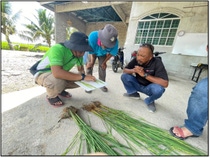
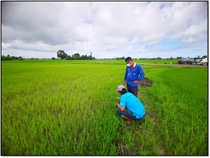
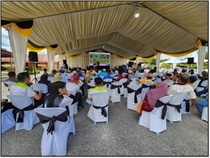
How
"Projek Lestari" - as it is called in Malaysia - focuses on developing a comprehensive stewardship and sustainable field management program to which smallholder communities can adhere. Besides direct training, the initiative indirectly contributes to overall yield improvements through collaboration with stakeholders to promote technology and mechanization through the likes of drones and small combine harvesters. Conventional methods are integrated to suit local farmers’ needs. All is captured through large scale demonstration plots which evidence the performance of the Clearfield Production System (CPS), based on the 4 Four Components and 5 Pillars of Clearfield (4K5R), from land preparation all the way to the harvest.
Throughout the 4K5R campaign, emphasis lies on using certified MR220CL2 seeds, registered BASF crop protection products and Clearfield stewardship as a complete package to achieve optimum control where previously farmers only made erratic use of seeds.
Attention is also given to several Good Agricultural Practices, from efficient land preparation procedures to direct wet seeding as opposed to the currently widespread practice of water seeding. The project is closely monitored by the local agronomy team: regular supervision and consultation are carried out at every critical phase of the crop. Soil samples were collected pre-season and tailored recommendations for precise nutrient management fertilization and other necessary interventions such as liming were formulated based on the analyses. or any measures needed such as liming for next round. For pest and disease management, farmers are trained to identify the target, determine threshold levels before treatment and select inputs with minimum impact to beneficial insects and aquatic organisms (as per the “Rice Check” Standard Operating Procedure).
Projek Lestari has been presented at the Malaysia National Rice Conference 2022 to share BASF’s expertise, contributions and commitment towards sustainable rice farming. This is the premiere national conference for rice stakeholders; participants include policy makers, academics, researchers, and extension officers. Interest was high: influential stakeholders have since approached the project team to collaborate on fostering the self-sufficiency and wellbeing of rice farmers in other Malaysian states.
Result


200 ha
land supervised

200
plot visits and consultations

150
extension officers trained

50
extension programs completed

6 mt/ha
average yield achieved
SDGs
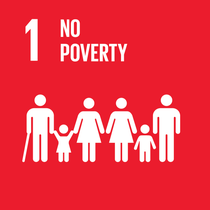
Greatly reduce the risk for pest and disease outbreak and other yield loss factor, thus securing income and livelihood for farmers.
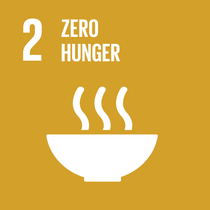
Raising average rice yields in Peninsular Malaysia in order to meet the government’s targets and thus boost food security.
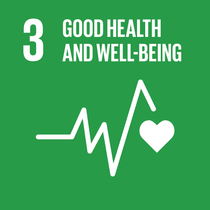
Use legal and registered inputs with the correct method, dosage and timing and with the help of drone technology.
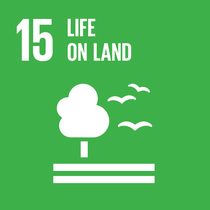
Promote good agricultural practice, adhere to stewardship and leverage agronomic expertise to achieve more resilient crops while minimizing environmental impact.
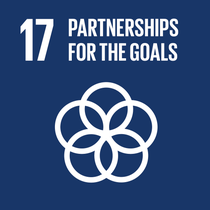
Collaborate with all stakeholders, including multiple agencies under Malaysian Ministry of Agriculture (DOA, MARDI, MADA, KADA, IADA, Felcra), all Clearfield seeds producers, input and service providers, farmer associations, as well as Crop Life Malaysia.
